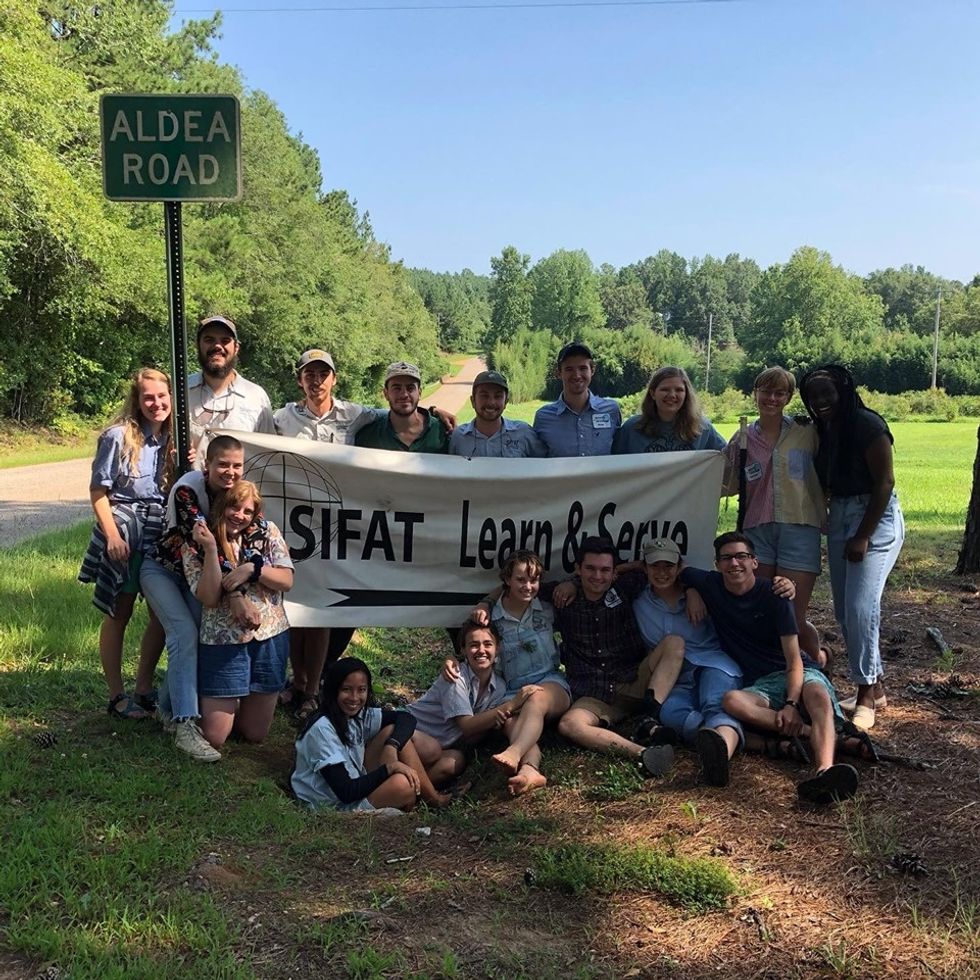I recently just finished an internship at an organization known as Servant in Faith and Technology or SIFAT. It's located in the middle of nowhere near Lineville, Alabama, but they do not let their remoteness stop them from impacting countries around the globe. SIFAT works to help people around the world gain better living conditions, teach others to do the same and to also think globally and act locally. They do this by implementing appropriate technology, teaching and equipping others, and holding summer camps for children, which is what I worked at. It was established by Ken and Sarah Corson.
They were missionaries in Bolivia and were given the option of earning a minister's salary or forgoing the money and living on the level of the people around them, and the couple chose the latter. They noticed every week that fewer and fewer people were coming to church services because they and their children were getting sick, and many were dying. They decided to help the people in the village by teaching them about having a proper diet and how to get the foods and the nutrients they needed, and many of their strategies helped to improve the health of the people there. They moved back to Lineville, Alabama in 1979 and purchased land to open SIFAT. They now have relationships and connections in over ninety countries.
One of the most important parts of SIFAT's programming is an appropriate technology (ap. tech.). Appropriate technology is defined as using the resources that one has to meet one's needs. Many of the people that SIFAT works within developing countries only earn two dollars a day. They must be creative and practical in the way that they meet their daily needs of food, water, and shelter. This is where ap. tech. comes in, for this approach seeks to use things that the people have on hand or have ready access to. During my time at the campus, I was able to learn some of the techniques used and taught at SIFAT.
The area I learned most about was construction. The appropriate technology intern, Kishore, had been working on an experimental house of which each wall was made of a different app. tech. I was able to help him some, and he taught me about the techniques he was using. The front wall was made of eco-bricks which were plastic bottles filled with sand and were held in place with adobe. As an alternative, the bottles can also be packed with trash. The left wall was insulated with plastic bottles. The back wall was insulated with bamboo which was tied in place and overlaid with chicken wire or plastic mesh and then covered in adobe. The right wall was made of ferrocement.
Ferrocement is a mixture of one part cement, three parts sand, and two- and-a-half to three gallons of water. Cement is expensive and mixing it with sand makes it last longer. Since the mixture is not as strong as pure cement, it must be reinforced. We reinforced the wall with chicken wire and made a mold by screwing plywood covered with plastic to the framing. After we poured and smoothed out a layer of ferrocement, we insulated the wall with straw and got it ready for the next layer of ferrocement.
All of the materials used would be readily available and, except for the cement, would be cheap to buy if purchasing was necessary for people in developing countries, and these techniques would give them away to build a sturdy and reliable house They also teach Leaf for Life which is a program that promotes the usage of plants that are rich in vitamins and nutrients among people in poor communities that do not have access to healthy foods. Plants such as bay leaves can be ground up into a powder to add to foods, so people can get the nutrients they need.
This helps them to stay healthy and live longer. These are just a few of the appropriate technology techniques that SIFAT teaches and implements. I found all of them very interesting, and it was exciting to see that people's problems and most basic needs could be met and solved by the simplest of items.
SIFAT spreads its knowledge by teaching community leaders, missionaries, and organization leaders about appropriate technology. People interested in learning about appropriate technology, health and first aid, community development, sustainable agriculture, and other sustainable practices can come to SIFAT's campus and participate in programs such as a ten-week practicum.
These people then take their newly acquired knowledge back to their communities to help the people there improve their quality of life and become self-sustaining. Some even help them start microenterprises to sell their handmade items. SIFAT even sells some of these items in their store on campus. These items range from key chains to blankets to bowls and plates.
Proceeds from the sale of these items are sent back to the makers of the products. SIFAT also teaches classes in Bolivia, the Philippines, Honduras, Ecuador, and Haiti. I had the privilege of meeting some of the people who had been through the program and had taken back the skills they had learned to improve the lives of the people around them. Aina, also known as Momma Africa at SIFAT, was from Nigeria. She worked with women and children refugees and women's rights. She and her family run a school in Nigeria, and she makes key chains out of plastic bags. She sells the key chains for a dollar apiece, and that one dollar will feed a child a meal. Isaiah is from the Democratic Republic of Congo, and he works with child soldiers. He teaches the children skills such as construction and mechanics so that they will have a way to make money and will not be recruited as soldiers.
Zarnab was about my age and was visiting SIFAT from Pakistan. Her father runs a Christian school in Pakistan, and her family has been coming to and working with SIFAT for several years. The dedication and love that these people have for their communities and the willingness to risk their lives in order to spread the Gospel and help others was both amazing and humbling. I heard several stories while I was there about people's experiences.
Many of the people in Aina's village lost their lives a few years ago when there was a Christian and a Muslim candidate running for president. The Muslim supporters decided to kill Christians in the area to try to keep the Christian candidate from winning the election. Aina was away at the time of the killings, but many of the people in her village were not as fortunate. These people risk their lives because they know the importance of helping their fellow men. If we do not help those in need who will? We have a responsibility to help those around us in a sustainable and practical way.





 people sitting on chair in front of computer
people sitting on chair in front of computer



 all stars lol GIF by Lifetime
all stars lol GIF by Lifetime two women talking while looking at laptop computerPhoto by
two women talking while looking at laptop computerPhoto by  shallow focus photography of two boys doing wacky facesPhoto by
shallow focus photography of two boys doing wacky facesPhoto by  happy birthday balloons with happy birthday textPhoto by
happy birthday balloons with happy birthday textPhoto by  itty-bitty living space." | The Genie shows Aladdin how… | Flickr
itty-bitty living space." | The Genie shows Aladdin how… | Flickr shallow focus photography of dog and catPhoto by
shallow focus photography of dog and catPhoto by  yellow Volkswagen van on roadPhoto by
yellow Volkswagen van on roadPhoto by  orange i have a crush on you neon light signagePhoto by
orange i have a crush on you neon light signagePhoto by  5 Tattoos Artist That Will Make You Want A Tattoo
5 Tattoos Artist That Will Make You Want A Tattoo woman biting pencil while sitting on chair in front of computer during daytimePhoto by
woman biting pencil while sitting on chair in front of computer during daytimePhoto by  a scrabbled wooden block spelling the word prizePhoto by
a scrabbled wooden block spelling the word prizePhoto by 
 StableDiffusion
StableDiffusion
 StableDiffusion
StableDiffusion
 StableDiffusion
StableDiffusion

 women sitting on rock near body of waterPhoto by
women sitting on rock near body of waterPhoto by 
 Photo by
Photo by  Photo by
Photo by  Photo by
Photo by  Photo by
Photo by  Photo by
Photo by  Photo by
Photo by  Photo by
Photo by  Photo by
Photo by  Photo by
Photo by  Photo by
Photo by 








